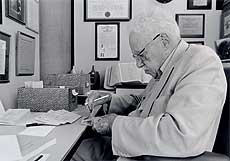
|
|
Richard J. Kent '34 | Frederic Cassidy '30 | Tom Linehan | William Brashear '68
DICTIONARY EDITOR SHAPED LOCAL LINGUISTICS Frederic Cassidy '30 1907 - 2000
Words like "chizzywink" (a mosquito in Florida) or "hooftie" (a hippie in Pennsylvania) may not be found in standard dictionaries, but Frederic Cassidy '30 believed that such words provide a window into the ways that we really communicate. Few scholars inspire a devoted following the way Frederic Cassidy did. He was the driving force behind the colossal project known as the Dictionary of American Regional English (DARE), which--when finally finished around 2007--will contain the definitions and origins of over 60,000 words and phrases in folk and regional usage. The sheer scope and ambition of the project, to which Mr. Cassidy, as chief editor, devoted more than 30 years of his life, garnered him praise from scholars, writers, and laypersons alike. The New York Times called DARE "one of the glories of modern scholarship" and labeled Mr. Cassidy "the undoubted hero of the enterprise," while language pundit William Safire declared him "America's folk laureate." The first volume of DARE went through five printings and sold 16,000 copies when it was released in 1985--quite an accomplishment for a 903-page lexicon that only went up to the letter "C." Behind it all was Mr. Cassidy's insatiable curiosity and a life-long love of language. Born in Jamaica in 1907, Mr. Cassidy's linguistic interests blossomed early, as he spoke standard English at home and Creole in the streets. His family moved to Akron, Ohio, when he was 12. He transferred to Oberlin from Akron University, earning a bachelor's degree in 1930 and a master's degree in 1932. "Oberlin saved my life," he once wrote. "Under Professors Charles Wager and Robert Jelliffe and others, I discovered that I wanted to teach." While at Oberlin, he also discovered Hélène Lucile Monod '30, a graduate student from France and his future wife. The couple continued their studies at the University of Michigan, where Mr. Cassidy earned a PhD in 1938. In 1939, he began teaching linguistics, history of the English language, and early English literature at the University of Wisconsin, the institution with which he would be affiliated for the rest of his life. The groundwork for what would become DARE was laid during the next couple of decades. Thanks to a Fulbright grant, Mr. Cassidy gained valuable fieldwork experience while studying the language of his native Jamaica. This labor of love and its fruits, A Dictionary of Jamaican English and Jamaica Talk, led to his selection in 1963 as chief editor of the DARE project by the American Dialect Society. It had been 70 years since the ADS had been founded to undertake the project, but it was not until Mr. Cassidy's appointment that the endeavor actually began to take shape. Building on his experiences in Jamaica, he developed a 1,847-question survey and, between 1965 and 1970, sent 80 researchers into the field to interview nearly 3,000 informants in over 1,000 communities all across the country. Supported by a small staff, Mr. Cassidy spent the rest of his life compiling, editing, and researching the origins of the two million entries generated by these interviews, in addition to the thousands more that interested word-lovers continue to send in. At the time of Mr. Cassidy's death on June 14, 2000, at the age of 92, only three of the anticipated five volumes of DARE had been completed. His work will live on, however, as a monument to an original and visionary scholar who spent his life dedicated to a pursuit that he enjoyed immensely. "My father loved words from the moment he was a very small child," said his daughter, Claire Cassidy '65. "So he was able to follow his bliss and make a good living." Mr. Cassidy was preceded in death by his wife in 1980, and his brother, Harold Cassidy '30, in 1992. He is survived by his sister, four children, and seven grandchildren.
by Aaron
Rester '99
|
